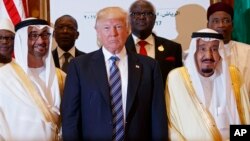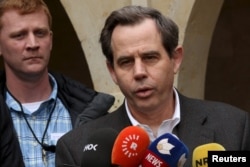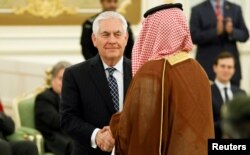A senior State Department official has defended President Donald Trump at an on-camera briefing for not mentioning human rights during his recent speech in Saudi Arabia.
On Tuesday, a reporter asked Acting Assistant Secretary of State for Near Eastern Affairs Stuart Jones what he would say to critics who say the president's speech on countering terrorism in Riyadh basically gave Saudi Arabia and other countries in the region a “free pass” on human rights abuses.
Jones said human rights continues to be part of the U.S. dialogue with Saudi Arabia and all the other countries in the region:
“But the fact that it wasn't featured in the speech doesn't mean that it's not part of the bilateral dialogue and it's not a part of what we're constantly talking about," he said. "And I think the fact that, you know, you can argue that by taking it out of the public debate and having those conversations directly and quietly will be more effective.”
'We are not here to lecture'
Trump emphasized unity with Muslim majority nations on countering violent extremism during his speech.
“America is a sovereign nation and our first priority is always the safety and security of our citizens. We are not here to lecture — we are not here to tell other people how to live, what to do, who to be, or how to worship. Instead, we are here to offer partnership based on shared interests and values to pursue a better future for us all.”
Some human rights groups and U.S. lawmakers criticized the president for not mentioning Saudi Arabia's human rights record, including Republican Senator Marco Rubio, who told CNN “we are not here to lecture” would not have been part of a speech he would have delivered.
Strong statement against extremism
During the president's first trip abroad, Secretary of State Rex Tillerson was asked about the issue of human rights and told reporters “it was not the central part of our conversations” with Saudi leaders.
At Tuesday's briefing, Assistant Secretary Jones was asked how he characterized Saudi Arabia's commitment to democracy. After a long, 20-second pause, he said, the U.S. was able to make significant progress with its Saudi and Gulf Cooperation Council partners in making a strong statement against extremism.
Jones announced that he is retiring after serving as U.S. ambassador to Iraq and Jordan, and as deputy chief of mission in Cairo. He told reporters this is a personal decision he made more than a year ago.






